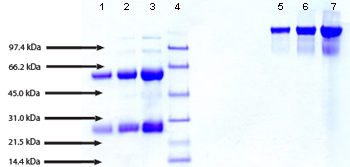Recombinant Human Isocitrate Dehydrogenase 1/IDH1
| Product name: | Recombinant Human Isocitrate Dehydrogenase 1/IDH1 |
| Source: | E.coli |
| Purity: | Greater than 94% as determined by reducing SDS-PAGE. |
| Buffer Formulation: | Supplied as a 0.2 μm filtered solution of 50mM Tris, 200mM NaCl, 10% glycerol, pH8.0. |
| Applications: | Applications:SDS-PAGE; WB; ELISA; IP. |
| Storage: | Avoid repeated freeze/thaw cycles. Store at 2-8 oC for one month. Aliquot and store at -80 oC for 12 months. |
| UOM: | 100ug/50ug/200ug/1mg/1g |
| Source | E.coli |
| Description | Recombinant Human Isocitrate Dehydrogenase is produced by our E.coli expression system and the target gene encoding Met1-Leu414 is expressed with a 8His tag at the C-terminus. |
| Names | Isocitrate Dehydrogenase [NADP] Cytoplasmic, IDH, Cytosolic NADP-Isocitrate Dehydrogenase, IDP, NADP(+)-Specific ICDH, Oxalosuccinate Decarboxylase, IDH1, PICD |
| Accession # | O75874 |
| Formulation | Supplied as a 0.2 μm filtered solution of 50mM Tris, 200mM NaCl, 10% glycerol, pH8.0. |
| Shipping |
The product is shipped on dry ice/ice packs. |
| Storage |
Store at < -20°C, stable for 6 months after receipt. Please minimize freeze-thaw cycles. |
| Purity |
Greater than 94% as determined by reducing SDS-PAGE. |
| Endotoxin | Less than 0.1 ng/µg (1 IEU/µg). |
| Amino Acid Sequence |
MSKKISGGSVVEMQGDEMTRIIWELIKEKLIFPYVELDLHSYDLGIENRDATNDQVTKDAAEAIK KHNVGVKCATITPDEKRVEEFKLKQMWKSPNGTIRNILGGTVFREAIICKNIPRLVSGWVKPIII GHHAYGDQYRATDFVVPGPGKVEITYTPSDGTQKVTYLVHNFEEGGGVAMGMYNQDKSIEDFAHS SFQMALSKGWPLYLSTKNTILKKYDGRFKDIFQEIYDKQYKSQFEAQKIWYEHRLIDDMVAQAMK SEGGFIWACKNYDGDVQSDSVAQGYGSLGMMTSVLVCPDGKTVEAEAAHGTVTRHYRMYQKGQET STNPIASIFAWTRGLAHRAKLDNNKELAFFANALEEVSIETIEAGFMTKDLAACIKGLPNVQRSD YLNTFEFMDKLGENLKIKLAQAKLSLEHHHHHHHH
|
| Background | Isocitrate Dehydrogenase [NADP] Cytoplasmic (IDH1) belongs to the isocitrate and isopropylmalate dehydrogenases family. IDH1 exists as a homodimer, binding one magnesium or manganese ion per subunit. Mutations of IDH1 have been shown to cause metaphyseal chondromatosis with aciduria and are involved in the development of glioma. IDH plays a role in the regeneration of NADPH for intraperoxisomal reductions, such as the conversion of 2, 4-dienoyl-CoAs to 3-enoyl-CoAs, as well as in peroxisomal reactions that consume 2-oxoglutarate, namely the α-hydroxylation of phytanic acid. |














